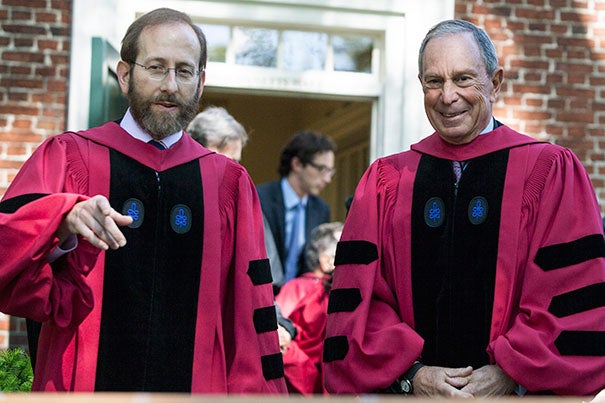
Harvard Provost Alan M. Garber (left, photo 1) and Michael R. Bloomberg, the principal speaker at Afternoon Exercises, prepare for the walk to Tercentenary Theatre to begin the morning portion of Commencement. President Drew Faust (photo 2) shares a moment with former President George H.W. Bush. Evelynn Hammonds (left, photo 3) escorts Aretha Franklin, one of the eight honorary degree recipients.
Photos (1, 3) by Stephanie Mitchell, (2) by Jon Chase/Harvard Staff Photographers
Snapshots of a sun-splashed day
A roundup of capsule stories and photos from Harvard’s 363rd Commencement
Begone cold. Begone rain. This was Harvard’s Commencement Day, where the annual outdoor ceremony depends on cooperation from the heavens to run pleasantly, smoothly, effortlessly.
The 363rd Commencement Day got that assist, and then some. The unusually sunny and warm conditions were pitch perfect for the vast Harvard Yard celebration, with dapples of light piercing the verdant tree canopy of Tercentenary Theatre.
Soon-to-be graduates beamed with bittersweet joy as they passed into the Yard, the joy that comes with reaching a goal hard-won, but also with knowing that the achievement means something deeply meaningful will be left behind.
In the arriving throng, mothers, fathers, sisters, and brothers mastered the art of walking sideways, shouldering through the packed crowds, polite but determined to reach their seats because Commencement is a triumph for families too.
As the echoes faded from the high sheriff’s thrice-tapped staff and his loud, top-hatted declaration that the “meeting will be in ordeeeeer!” the crowd was asked to stand for the national anthem and first gasped, then cheered when the singer was announced: Aretha Franklin, the “queen of soul,” on hand to receive an honorary degree.
The morning held Aretha and more: dignitaries in black robes and colorful hoods, replete with pomp and tradition as only a centuries-old institution can muster. There was held a former president and a former mayor, and the august treasure of some of society’s most accomplished individuals.
But the morning was most pointed at the future, as a new generation of leaders, artists, teachers, scientists, designers, chaplains, doctors and many others received their degrees and prepared to make their marks in the wide world. The story of Harvard’s Commencement Day is woven from the treads of hundreds of individual stories, a sampling of which follow.
— Alvin Powell
Warm welcome for former president
Just before Commencement began, a crowd gathered on the grass just east of Harvard and Massachusetts halls to watch this year’s honorary degree recipients line up for the traditional procession. They were difficult to see from the back. With images of glamour dancing and no idea who the honorands were, one young woman asked another: “Who’s that chick everyone is taking pictures of?”
Well, the cameras were flashing and graduates in robes were leaning back smiling for selfies with an honored guest, but it was no chick. It was George H.W. Bush, 41st president of the United States, smiling up from his wheelchair. He looked much like his old self, an impression enhanced by his now-signature colorful socks, visible between his hiked-up pants and brown loafers. (For the ceremony, he wore zigzag stripes in a rainbow of hues.)
“My only disappointment,” said Richard Griffin ’51, watching the hubbub around Bush, “was that he didn’t arrive by parachute. That would have been something.”
— Corydon Ireland
Back-row seat, front-row day
Sitting as far from the stage as you could get in the last row, tucked on a muddy patch of grass wedged between Widener Library and Boylston Hall, it was hard to see the massive video screens stationed around Tercentenary Theatre. But Debra Mendoza and her mom, Anita Hernandez, of East Chicago, Ind., didn’t mind. While they didn’t have an ideal vantage point to watch Mendoza’s son Manny graduate from Harvard College, they were grateful that the weather on this Commencement morning was sunny and warm, unlike the Class Day celebration. “It was cold, rainy. I’ll take this any day,” Mendoza said. The women were most eager to see Manny get his diploma later at Leverett House. Manny Mendoza, 22, won’t have much time to celebrate, however. Next week, he heads to Oklahoma as a chemistry instructor for two years as part of Teach for America.
— Christina Pazzanese
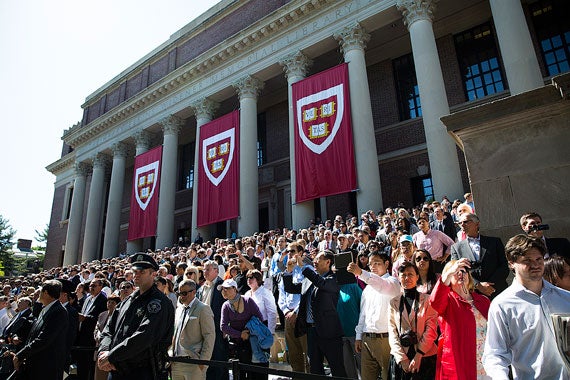
Say cheese for the smartphones
Smartphones were the item du jour during the first official ceremony on Commencement morning, a service at Memorial Church that included songs and a brief sermon. Seniors texted family and friends to see if they had secured seats in Tercentenary Theatre, and snapped photos of their classmates in their caps and gowns. And even with classes long over, one Kirkland House resident took notes.
“I wrote it down,” said social studies concentrator Jasmine Omeke, who used her smartphone to capture the line “for no vision and we will perish” from Pusey Minister Jonathan Walton’s address. “It’s very humbling to hear that at the end of these four years,” added Omeke. “We just have to have a goal in mind, and we can reach it and achieve it.”
Walton used his own phone for perhaps the most important purpose of all: a selfie. “Let me begin by getting the most important thing taken care of: Everybody say cheese,” he said, proceeding to raise his arm for a shot of himself with the seniors jammed into the pews behind him.
On a more serious note, Walton urged his young audience to use their educations to help combat rising inequality and unequal access, saying, “Our planet cannot afford another generation of those who place profits over people and who embrace the ‘greed is good’ ideology over global sustainability. Your class gets this.”
— Colleen Walsh
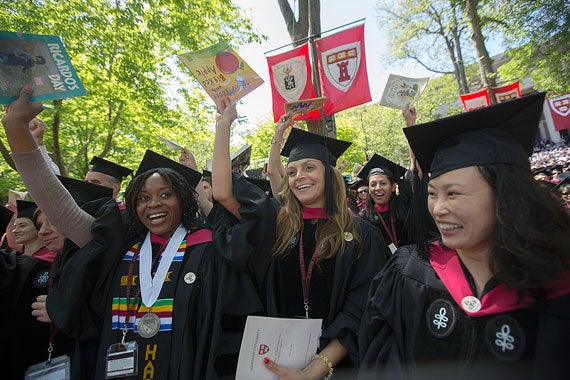
“I have made friends for life”
Soaking up the fun outside Memorial Church was Lowell House resident Christian Fohrby. A native of Denmark, he whistled the “Fair Harvard” hymn as he waited for his roommate, who had dashed back inside the church to grab the cap he had left behind.
Fohrby said he would always associate his Harvard time with the amazing people he met on campus. “They told me that the professors were going to make the difference, and the professors were great, but it’s really the people I’ve met,” he said. “They have been fantastic. … I have made friends for life, and I am so happy.”
— Colleen Walsh
When caps are also statements
Several graduates who are part of the Dudley Co-Operative Society decorated their caps in grand style. Francisco Maldonado Andreu, a Romance languages and literatures concentrator, covered his hat with bits of memorabilia collected during his Harvard years. A little purple clown clinging to its edge was “a celebration for goofiness,” and reminded him of good times on campus.
Social studies concentrator Sam Arnold’s hat was a mini-arboretum. Covered with linden, oak, and maple leaves, and several small plastic trees, it was a nod to his Harvard classes on forestry and nature, he said, and his interest in urban planning. “Also,” he added, “it’s just pretty.”
The students had shared the fun of crafting their creations into the early morning, in true co-op fashion. “We were supporting each other and sharing our anxieties and excitement,” said Andreu. Their only problem, he said, was: “We only had one glue gun.”
— Colleen Walsh
And over there, Turkey’s president
With all the visiting dignitaries and VIPs swirling around Harvard Yard, including former President George H.W. Bush, former New York City Mayor Michael Bloomberg, and singer Aretha Franklin, security, police, and the Secret Service had little to do, and calmly stood in the background. But shortly before Commencement began, one graduate’s father arrived at Morgan Gate with a grander flourish. A motorcade of state police motorcycles, black SUVs, vans, and a limousine pulled up, slipping into the Yard, and out came Turkish President Abdullah Gül, whose son Mehmet Emre Gül was graduating from the College.
— Christina Pazzanese
Cute puppy: 1, Yard procession: 0
As students from Leverett House, the last College graduates to enter Tercentenary Theatre, made their way up the walkway, a well-meaning interloper threatened to derail their procession. A cute and spirited golden retriever puppy, sporting a jaunty scarf bearing the words “Future Leader Dog,” proved irresistible to a crush of students who hopped out of line to greet and pat the fuzzy yellow pooch, causing temporary disarray.
— Christina Pazzanese
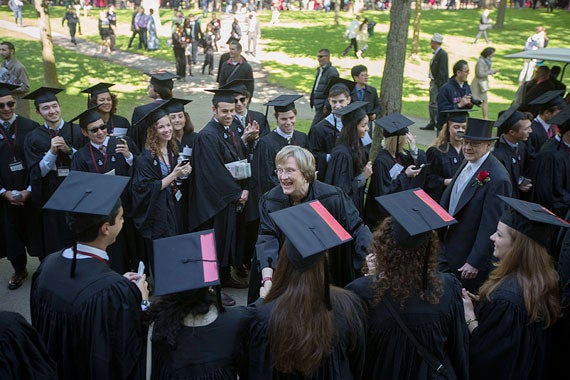
Representing Classes of ’39, ’40
It was late morning when George V. Kaplan ’40, M.B.A. ’47, sat down on a folding chair in front of Stoughton Hall. Across Harvard Yard and past University Hall, the crowds thickened toward the stage where Morning Exercises were underway. But a chair was free next to Kaplan, a trim man wearing a narrow-brimmed straw hat.
“The Yard hasn’t changed,” he said, looking back on his own time there, starting 78 years ago. “That’s one of the few things.” When Kaplan graduated with a degree in political science in 1940, for one thing, there were no women in Harvard classrooms. (That would change in 1943.) “They didn’t think of it,” he said.
By 1941, Kaplan had been drafted into the U.S. Army, where he spent the next 39 months as an enlisted man, much of it in combat in the Pacific theater. After the attack on Pearl Harbor, he was aboard a troopship heading through the Panama Canal. The first stop was Australia, where Kaplan said all the beer and Coca Cola was offloaded and replaced with ammunition. He and his ship continued on to Guadalcanal, where his unit went into the fighting in support of U.S. Marines.
After the war, Kaplan enrolled at Harvard Business School. He graduated in 1947 and went into the insurance business.
Kaplan doffed his straw hat. Inside, the hatband revealed that it was a souvenir from his 25th Harvard College reunion, “49 years ago!” Kaplan had spent part of the morning scanning the crowd for old classmates. So far, there weren’t any. “I read the obituaries every morning,” he said, “to see if I’m there.”
Representing the oldest College class was Robert Rothschild ’39. He studied physics as an undergraduate, and during World War II instructed radar officers and worked on some of the first early-warning systems. Returning after that to the family furniture business, he continued to cultivate his passions for mathematics, art, and saltwater sailing.
The traditional alumni procession formed up near the John Harvard Statue. Rothschild — sporting a crimson Class of 1939 ball cap, a green tie, and bright violet socks — was seemingly being interviewed by Ann Grace ’39. She held a small electronic device up to him as they talked. “You’re young,” said Rothschild, who is 97. (Grace is 95.)
The device turned out to be part of her hearing aid system. “But the best hearing aid I have is my daughter, Ann,” said Grace, gesturing to a woman on her left. Someone nearby said, “I thought you were interviewing Mr. Rothschild for an oral history.” Grace’s daughter spoke up, saying of her mother: “She is oral history.”
— Corydon Ireland
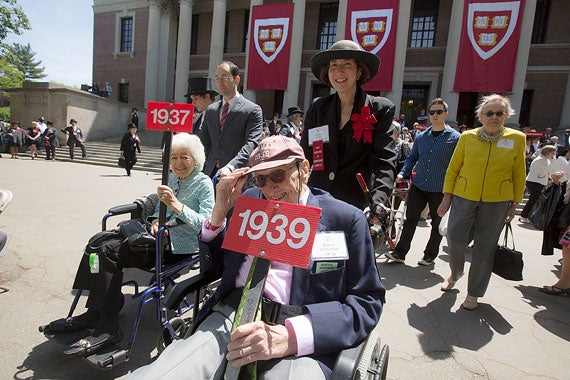
Recalling when tuition was $400 a year
Lillian Sugarman ’37, snow-haired and lively at 98, represented the oldest Harvard-Radcliffe class during Commencement. “You can’t imagine all the eras I’ve lived through,” she said, since she was born in 1915. “When I grew up, there wasn’t even radio, much less television.”
Sugarman, the daughter of Lithuanian immigrants, was Lillian Sher at college. She had applied only to Radcliffe, encouraged by a high school Latin teacher in her native Lynn, Mass. “We had our own campus,” Sugarman said of those happy undergraduate years, which started in 1933. “We had our own library.” (She could not recall being in Harvard Yard, which was then closed to women.)
First, she majored in mathematics (not a good profession for a woman, someone at the time advised), then music (but Radcliffe’s program was “not well developed,” said Sugarman), and finally German literature, made easier by her parents speaking Yiddish at home. “I was glad,” she said. “It opened up worlds to me.”
Tuition was $400 a year; a shared room on Sacramento Street cost $2.50 a week. Breakfast at a drugstore was 15 cents; dinner at a coffee shop on Shepard Street cost half a dollar. “Fifty cents was a lot of money,” said Sugarman of those Depression-era college years. “I felt like Mrs. Vanderbilt.”
She still does Zumba four times a week and started using a wheelchair only last year. As for probably being the oldest graduate on hand at Commencement, she quipped, “I’m trying for 100. After that I don’t care.”
— Corydon Ireland
Khurana bids departing Cabot students adieu
Led by bagpiper Bob Cameron, the procession of 105 graduating seniors from Cabot House made the long but joyful walk across the grassy quadrangle this afternoon to collect their diplomas and bid farewell to a place they’ve called home for the last three years.
Rakesh Khurana, the Marvin Bower Professor of Leadership Development at Harvard Business School (HBS) and professor of sociology in the Faculty of Arts and Sciences (FAS), presided over the intimate celebration as co-master of Cabot House along with his wife, Stephanie. They were joined onstage by Emily Stokes-Rees, the Allston Burr resident dean and Benjamin Solomon-Schwartz, one of the resident House tutors. Although well familiar with Harvard’s many charms, first as a grad student at Faculty of Arts and Sciences and then later, as member of the HBS faculty, Khurana said that for year, he never quite grasped what people meant when they described the College as “the crown jewel of the University.”
“I enjoyed being a graduate student and a [teaching fellow] and a professor, but it was not until I got a chance to be co-master at Cabot House that I understood what it was like to love a community,” he told the assembly of students, parents, friends and loved ones. “We’ve learned so much from you.”
The couple is wrapping up their fourth year as House Masters, a role they will continue to hold even after Khurana assumes his new post as dean of Harvard College July 1.
Invoking Cabot’s rich history as part of Radcliffe College, where the women who lived there a century ago demanded suffrage and later full integration into the University, Khurana spoke of honoring the trust that society has placed in them as Harvard graduates and coming together during this period of great change on campus and in the world.
“I would contend that there’s never been a time when the demand for what you have… — your talents, your passions, your sense of optimism and understanding of each other — has been more needed,” he said. “We need people who bring strong values to work, people who are committed to lives of integrity, who care about other people and want to do things that make the lives of people they don’t even know, or will know, better.”
Harvard “has its flaws, it has its problems,” Khurana said, “But I do believe that it is one of the greatest places in the world because it’s never been simply about bringing people together who are the best in the world, but rather about bringing people together who want to be the best for the world.”
— Christina Pazzanese
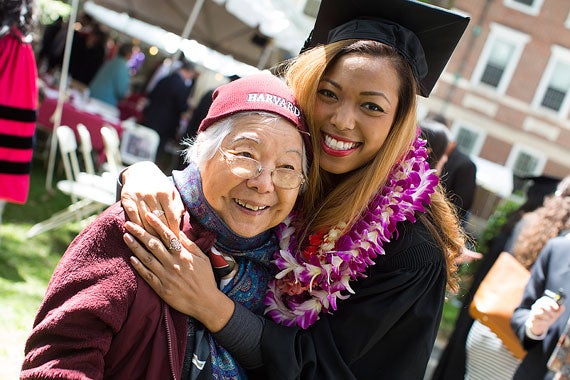
Intimate moments in the Houses
The morning Commencement exercises in Tercentenary Theatre are partially a pageant, complete with top hats, tails, black robes, Latin speeches, famous honorands, and conferring of degrees. But the afternoon brings smaller ceremonies at the Houses, where the newly minted graduates receive their diplomas, and where tears and hugs flow freely among family and friends.
In a corner of the Winthrop House courtyard, Bo Han, a computer science concentrator, and his mother gazed at his diploma, sheathed in a crimson folder. “I am very excited,” said Han who will head to San Francisco shortly for a job at Google. His parents, who made the trip from Hong Kong for graduation, beamed. Han’s father summed up his feelings about the day, saying simply: “It’s great.”
Nearby, senior and Marine Corps 2nd Lt. Taylor Bruce Evans, his year-old son Connor in his arms, reflected on his time in Cambridge as a student and husband and father of two. “Everything becomes much more deliberate. You have to be very cognizant of how you spend your time, what your priorities are. You always have to-do lists,” said Evans, who heads to the Basic School in Quantico, Va., next month.
Sociology concentrator Michelle Matsuba’s family, who had traveled from Hawaii and California, swarmed the new graduate as she stepped off the stage in the Winthrop House courtyard. The party’s matriarch, Sue Matsuba, 93, wore a new crimson fleece and hat with Harvard in white letters across the front. Next to her, the graduate’s mother, Jo-Anne Prophete Matsuba, struggled to take it all in. “It’s just amazing. It’s just so phenomenal. I just can’t even get wrapped around it. We’ve always been very proud of her. She’s always been a smart child, and we knew that she was going to do great things, and she is.”
“Harvard has given me an opportunity to encounter people and learn perspectives that I never could have otherwise,” said Jasmine Park, a history and East Asian studies concentrator who posed for pictures with her proud mother and aunt. “I am super, super excited to see what my classmates are going to do and how they are going to change the world,” said Park, who hopes to work for a nonprofit in international development and then head to graduate school.
— Colleen Walsh
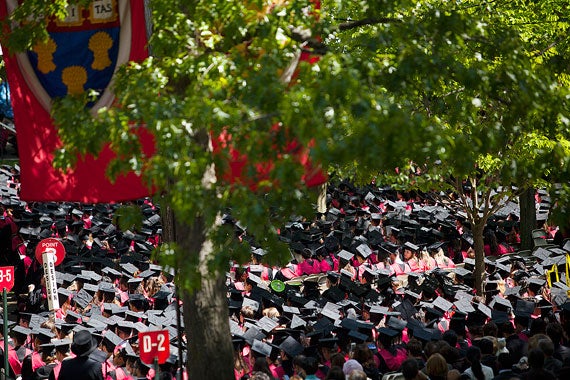
Courtesy of Chicago, a refurbished gate
What was likely the last official Commencement event in Harvard Yard late this afternoon had some swing to it, not like Aretha Franklin’s singing in the morning, but the kind of swing you might find, say, at Johnston Gate.
Harvard’s main portal, on the west side of the Yard facing Massachusetts Avenue, will be 125 years old in December. Its filigreed wrought iron gates were built to accommodate the width of a carriage.
A crowd of donors gathered at the gate to celebrate the spot’s recent facelift, including two new trees, soil, mulch, and groundcover (liriope) that will soon spread and bloom in season with violet flowers. Landscape architect Michael Van Valkenburgh provided the design pro bono. He is the Charles Eliot Professor in Practice of Landscape Architecture at Harvard’s Graduate School of Design.
The $5,000 landscaping project was funded largely by the Harvard Club of Chicago and was inspired by 2012-13 Nieman Fellow Blair Kamin, the Chicago Tribune’s Pulitzer Prize-winning architecture critic. Without Kamin’s acumen and eye, said club spokesman Richard W. Shepro ’75, J.D. ’79, Harvard’s often-used but little-noticed gates might just be something “which many of us pass by.” (In early 2013, Kamin led a January Arts Intensive on the gates and edited an e-book about them.)
It was Samuel Johnston, Class of 1855, who bequeathed $10,000 to build Harvard’s first formal gate. His idea not only inspired 25 other gates, said Kamin, “but changed the course of Harvard architecture for the next century” by returning the aesthetically eclectic Yard to the classical Georgian style once established by Harvard and Massachusetts halls.
Surveying the donors and friends, Philip W. Lovejoy, the Harvard Alumni Association’s new executive director, quipped, “This is proof it takes a village to take care of a gate.”
— Corydon Ireland
For a pdf version of the Harvard Gazette’s 363rd Commencement print issue, click here.




